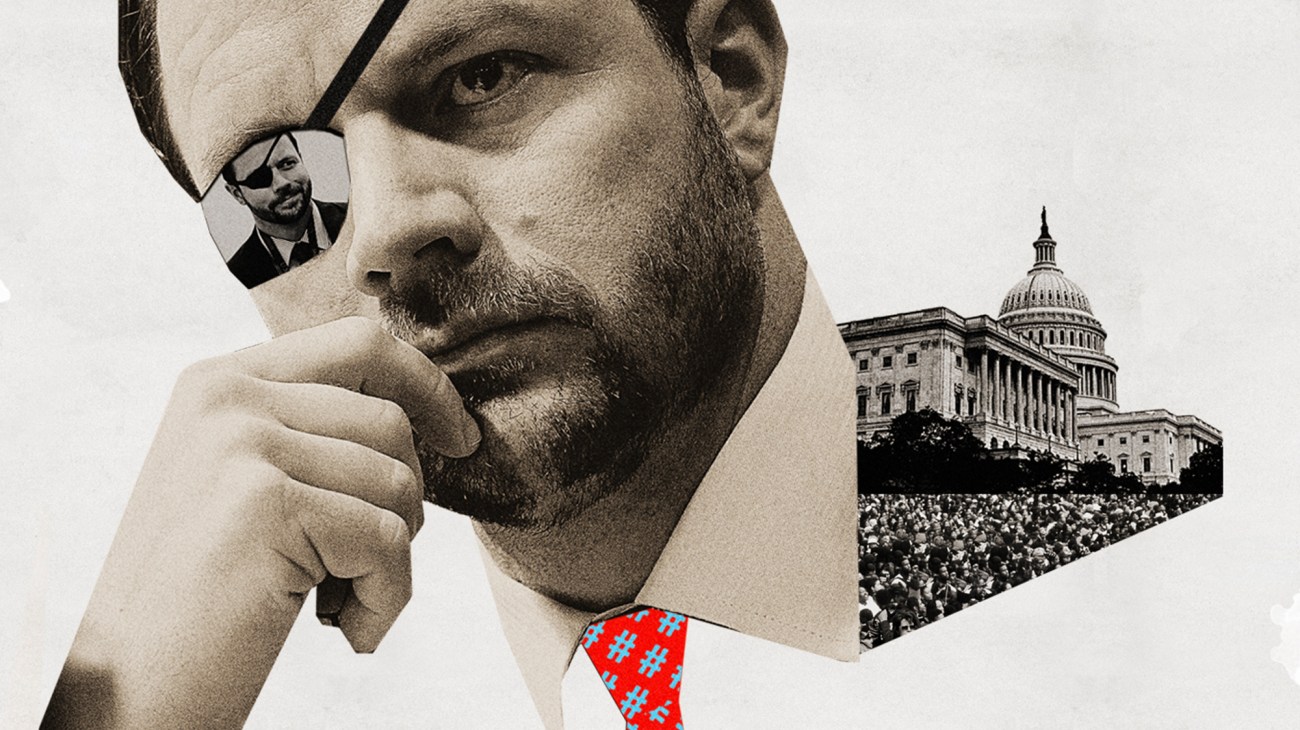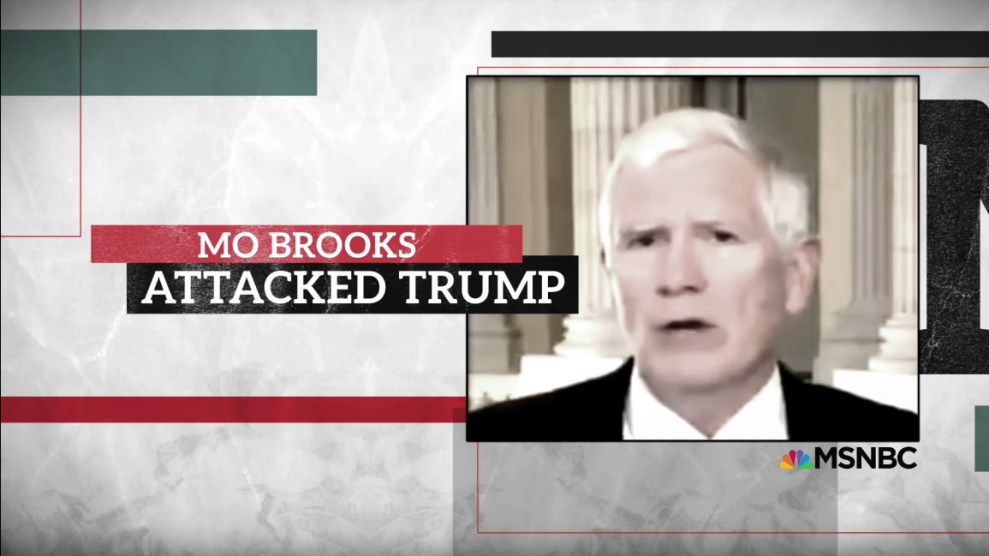
Dan Crenshaw started off as a joke. On the last episode of Saturday Night Live before the 2018 election, Pete Davidson was rifling through headshots of candidates when he got to the 35-year-old retired Navy SEAL from the Houston area. “You may be surprised to hear he’s a congressional candidate from Texas and not a hitman in a porno movie,” he said, as a photo of the Republican—short wavy brown hair, trim beard, eye patch—flashed across the screen. Davidson started to laugh. “I’m sorry, I know he lost his eye in war or whatever.”
The reaction was as instantaneous as it was predictable: Angry tweets. An angrier press release. An apologetic phone call from Lorne Michaels. But as Republicans called for Davidson’s head, the butt of the joke appealed for peace. The next day, Crenshaw filmed a video in his car.
“I want us to get away from this culture where we demand apologies every time someone misspeaks,” he said. “I think that would be very healthy for our nation to go in that direction. We don’t need to be outwardly outraged. I don’t need to demand apologies from them.” The real tragedy, he added, was that the joke wasn’t funny.
A week later, Crenshaw—now a representative-elect—was live from New York to accept the apology he insisted he didn’t want. (“Maybe the most uplifting moment in American politics I’d seen in a decade,” gushed the conservative pundit Ben Shapiro.) A few days later, Crenshaw wrote an op-ed for the Washington Post calling for civility in politics. As Republicans limped into the new year, Crenshaw entered Congress as the face of a cultural counterrevolution, a beacon in a fog of toxicity.
A year into his Washington career, Crenshaw has emerged as the breakout star of the Republican Party’s Class of 2018. He’s one of the most sought-after fundraisers and speakers in town, and activists are already buzzing about a presidential run. Crenshaw has the kind of platform it takes many politicians years to build, in part because at first glance he’s the type of conservative who seems to have gone extinct during the Trump years—young and quick-witted, with a record of personal heroism and an earnestness about following our better angels. In a March 2019 profile of Crenshaw, Politico offered him as a counter to sycophantic Florida Rep. Matt Gaetz, arguing that the Texan supported “the possibility that the future of the Republican Party could be more conservative than Trumpist.”
Yet for all that promise, his brief tenure has shown how strong Trump’s grip on the GOP is. Members of the Never Trump crowd of Republican exiles had high expectations for Crenshaw, only to see him fall in line and run interference for the president—on everything from the Ukraine scandal to the administration’s child-separation policy—in a manner often indistinguishable from Trump’s most obsequious Republican allies. “The pressure every day has been, are you going to go with Trump and defend him, or are you going to stand on principle and make the argument for what’s right?” says Republican dissident Heath Mayo, the Texas-born founder of an online movement dubbed #PrinciplesFirst, aimed at reclaiming the party from Trump. “I think he’s made that decision incorrectly, and played it too cute by a half almost every time.”
Crenshaw’s first appearance on Face the Nation, a couple weeks after getting elected, was telling. “This broad-brush criticism that the president is somehow undermining our democracy—I always wonder what exactly we’re talking about,” he remarked. Like most of his Republican colleagues, Crenshaw appears to have made the calculation that his political fate depends on not trying too hard to find out.
Born in Aberdeen, Scotland, to American parents, Crenshaw spent his childhood bouncing between the Houston suburb of Katy and various oil industry hubs overseas—Colombia, Ecuador, Egypt. His father was a petroleum engineer; his mother, a nutritionist, died of cancer when Crenshaw was 10. He traces his professional awakening to a book he read as a kid called RogueWarrior, by an ex-SEAL named Dick Marcinko. It was real Rambo shit: In one scene, Marcinko eats the brain of a live monkey to impress a group of Cambodians. Crenshaw was hooked. “I planned every bit of my life, from that moment on, on becoming a seal,” he later said. After high school in Colombia and four years at Tufts, he went straight to seal training. By 2008, he was in Fallujah.
Nearing the end of Crenshaw’s third deployment, in June 2012, his unit was dispatched to a village in Afghanistan’s Helmand province. As they cleared the area, his interpreter stepped on an IED a few feet in front of him. Getting blown up, Crenshaw tells people who ask—and people often ask—“feels like a truck hit you, and there’s a bunch of guys in the truck shooting you with a shotgun, and also pouring Tabasco sauce all over your body.”
The blast dismembered the interpreter; Crenshaw was knocked over. According to his official Navy record, Crenshaw “selflessly refused to be carried on a litter, thereby preventing his comrades from exposure to enemy fire.” He walked to a medevac, where he was promptly put into a medically induced coma. Crenshaw lost his right eye but eventually regained vision in the left after multiple surgeries. He made two more noncombat deployments before higher-ups finally pushed him into medical retirement.
Unsure exactly what he wanted to do, but with a notion of working on national security policy, he enrolled at Harvard’s John F. Kennedy School of Government in 2016—as strange a time as any to begin studying politics. On election night 2016, Crenshaw’s Harvard cohort crowded into a Cambridge bar and munched on red, white, and blue cupcakes as the results came in. Some students cried the next day; others poured out their frustrations on the few conservatives in their midst. Crenshaw now says he voted for Trump in 2016, but he kept it to himself back then—his friend and classmate Allyson Walther, a former Navy pilot and current reservist, told me he “didn’t really publicize his support for anybody” that year.
Harvard “makes everybody think they can be in politics,” Crenshaw later said, and in his free time, he took a special class for veterans on how to run for office. In the classroom, Walther recalled, Crenshaw was a lonely voice from the right. “Oftentimes they’ve just never spoken to a conservative,” he has said of his classmates, attempting to explain how the left could be so intolerant of people who share his politics. (According to Walther, classmates sometimes tag Crenshaw in the alumni WhatsApp group when Trump et al. do something they don’t like; he occasionally responds.)
Crenshaw took a job on Capitol Hill after graduation and was preparing for a career at the Department of Defense when longtime Houston-area Rep. Ted Poe announced his retirement in the fall of 2017. A friend on the Hill convinced Crenshaw to run.

Dan Crenshaw went straight into Navy SEAL training after college, followed by three combat tours.
Department of Defense/Wikimedia
One of the reasons Crenshaw is so important to the GOP is that he offers a vision of its future at a moment when the future seems uncertain. Texas’ jagged 2nd District hugs the outer loop of Houston like a dancing Baby Groot, starting in the master-planned communities northeast of the city and pulling in historically Republican suburbs before curling down into LGBTQ-friendly Montrose. Mitt Romney won the district by 27 points. Donald Trump won it by nine. In 2018, Sen. Ted Cruz edged out Beto O’Rourke there by one—close to the Texas Republican’s margin statewide. The 2nd District, right now, might be a tipping point for Texas.
Houston has traditionally churned out a mellower sort of Republican (think George H.W. Bush), but over the past decade, suburban culture warriors have been ascendant, led by Dan Patrick, a onetime talk-radio host who got elected lieutenant governor in 2014 and made transgender bathroom laws a keystone issue. Conservative activists dominate GOP primaries in Harris County, but the increasingly diverse Houston electorate often has far different impulses than the party’s immigrant-hating and bathroom-policing wing. Crenshaw, a newcomer, was able to move between both worlds.
“He’s an interesting, young, attractive candidate in a party that is somewhat sclerotic,” says Jay Aiyer, a Houston-based consultant and Texas politics expert. Crenshaw didn’t come out of the party’s ideological institutions, and he had no record of activism—he was a blank slate. “If you were gonna try to give him a modern equivalent, his background is really, really similar to someone like John McCain.”
“Like John McCain” can be a mixed blessing in GOP politics these days. (Crenshaw has criticized Trump’s persistent belittling of the late senator.) Where Crenshaw’s background appealed to mainline Republicans, some right-wing activists viewed him with suspicion. The culture warriors dug up Facebook posts in which Crenshaw criticized Trump’s anti-Muslim rhetoric and took issue with Christians focused on opposing same-sex marriage. They bashed him as a godless liberal. But their attacks only reinforced his message: He was not running to represent the suburbs of yesterday. “You keep electing old, rich, white people to the seat,” Crenshaw told the Weekly Standard, “you can expect the Republican party to be gone in 50 years.” He wanted to make conservatism “cool and exciting again.” He jogged 100 miles around the district in five days to drum up news coverage, campaigned at CrossFit, and gave away AR-15-style rifles emblazoned with the SEAL trident. Campaign materials featured his headshot with a Texas flag for an eye patch.
Crenshaw was egged on into running by John Noonan, a longtime Republican national security hand and former nuclear launch officer who had pushed conservatives to reject Trump in 2016. But Crenshaw drew support from the red-meat crowd, too. He got a big boost from another friend, Michael Berry, a right-wing radio host based in Houston, who long peppered his commentary with jokes about African American victims of gun violence. Crenshaw made the primary runoff by 155 votes, then won the runoff by 40 points. In a state where the party was in turmoil, he was a unifier.
“Let’s face it: When you have suburban Republican-club women describing a candidate as a sexy pirate, how do you fight that?” says Ed Emmett, the longtime Harris County judge who was swept out in the 2018 Democratic wave, even as Crenshaw won a narrow victory. “You just can’t beat a sexy pirate.”
There’s an alternate universe in which you’ve still never heard of Dan Crenshaw. If Davidson had just made fun of, say, Georgia’s Brian Kemp instead, Crenshaw might have quietly disappeared into the anonymity of Capitol Hill, made friends with the right people, and eventually, if he kept voters happy, worked his way up to a position to run for something bigger. But SNL gave Crenshaw the floor, and he hasn’t yielded it since.
Lamentations about comity have always been a good way to get attention in Washington, but Crenshaw has sharpened his pitch into an ideology in itself. By the time he took office he’d inked a quarter-million-dollar book deal—“sort of a self-help book,” he told one interviewer, about surviving “outrage culture.”
Crenshaw believes that the “mental toughness” and “grit” that got him where he is today are being eroded. Instead, people are driven by “this idea that you have to be offended, that aggrieved victim status is the greatest thing you can accomplish,” he told Ben Shapiro last spring. That sense of victimhood has changed the way young left-leaning voters approach politics. Because young people on the left are socialized to feel victimized by the slightest provocation, he contends, they embrace identity groups to reclaim a sense of power.
“When you divide people up into different groups and talk about intersectional hierarchies of victimhood,” he told the comedian Joe Rogan, “fundamentally what it is is you’re dividing people up, and you’re saying your group is oppressed by that group, and if you vote for me, I’ll give you power over that group.”
Outrage politics isn’t just ruining comedy, in other words. It’s a threat to democratic society.
When Captain America sees your Captain America glass eye. #merica pic.twitter.com/0xHb9GjSmV
— Rep. Dan Crenshaw (@RepDanCrenshaw) March 8, 2019
If what Crenshaw is saying sounds familiar, that’s because it is. In the Trump era, conservatives have embraced “outrage culture” as the culture war’s new frontier, the scarier successor to decades of PC policing. Donald Trump Jr.’s first book, published in November, is titled Triggered. Glenn Beck’s Addicted to Outrage came out in 2018. When Crenshaw dropped by Candace Owens’ podcast to talk, in part, about his forthcoming book, the right-wing commentator replied that her book about outrage culture was also due out soon. It’s enough to make you wonder who, in fact, is really outraged.
Indeed, Crenshaw’s desire for “good-faith” idea-driven debate seems to fade when there’s an opportunity to score points against the opposition. Take what happened with Rep. Ilhan Omar. Last March, the Minnesota Democrat gave a speech to the Council on American-Islamic Relations in which she praised the group for defending a vulnerable community. “CAIR was founded after 9/11 because they recognized that some people did something and that all of us were starting to lose access to our civil liberties,” she said. Crenshaw pounced. (CAIR, for the record, was founded in 1994.)
“First Member of Congress to ever describe terrorists who killed thousands of Americans on 9/11 as ‘some people who did something,’” he tweeted, with a link to the video. “Unbelievable.”
Crenshaw’s tweet started a chain reaction of outrage. The New York Post front page depicted the burning World Trade Center with the text “Here’s your something.” Brian Kilmeade said, “You have to wonder if she’s an American first.” The president eventually told Omar to go back to the country she fled as a child. She was besieged with death threats.
Omar referred to 9/11 the way she did because that’s just how people talk—her point was that one group of people doing anything shouldn’t cost an entire religious minority its rights. Crenshaw didn’t even have a problem with the substance of her argument, just her phrasing, he explained in an interview not long afterward. In fact, he agreed with it. When Omar’s colleagues called him out, Crenshaw played the innocent. The outrage mob was going after him!
Asked about the Omar controversy, Crenshaw’s spokesperson, Kerry Rom, directed me in an email to Crenshaw’s Washington Post op-ed about civility, saying his statement “fell in line with the guidelines of debate he lays out…He attacked an idea/a statement, not the person behind it. That’s the appropriate way to disagree in public discourse.”
It was fitting that someone who was elevated to public life as the anti-outrage candidate was feeding it so eagerly in practice, because when you get down to it, the backlash to outrage culture is no different from anything else in politics; it’s a choice about what you get mad about and what you let slide. In this case, Crenshaw targeted the words of an immigrant from a community (Somali refugees) targeted by Trump for exclusion from the country, who belongs to a faith group also targeted by the president for exclusion, discussing a real period of discrimination against people like her. Crenshaw could have spoken out about those things; instead, he used his big platform to make the smallest possible point.
A month later, when Crenshaw defended his criticism of Omar on The View—because Crenshaw is already the kind of politician who appears on The View—co-host Joy Behar brought up Trump’s famous defense of the violent white nationalist mob that descended on Charlottesville in 2017, in which the president said there were “very fine people on both sides.” Crenshaw tried to correct her.
“In that same sentence when he said that, he also said, ‘I am definitely not referring to white nationalists,’” Crenshaw said.
“Why do you apologize for him?” Behar asked.
“I’m not apologizing,” Crenshaw said. “You have to read what he actually said.”
Trump did say, later in his remarks, that he wasn’t referring to white nationalists—but who else would have been attending a white nationalist rally? It was the kind of quibble that begged the question of why it was being raised at all; it does not matter if a glass is half empty or half full if it contains arsenic. “He’s been angling, he’s been trying to come out clean on the other side by not angering folks,” says Mayo, the Never Trumper. “And in this moment, if you’re playing politics and angling, you’re not being principled.”
There’s a lot that a principled young do-gooder could find to decry in Trump’s Washington—massive corruption, the use of foreign policy for personal gain, the targeting of political enemies, a deliberate effort to block action on climate change (an issue Crenshaw says the country should be concerned about), routine flouting of laws and precedents, and a persistent targeting of communities of color. But talking about any of those things is a terrible way to get ahead as a Republican. Just ask Rep. Justin Amash.
If you set aside the outrage-outrage, Crenshaw isn’t really selling anything new. He believes Republicans can win over young people by talking more about the national debt and how to rein in spending on Social Security and Medicare—something Republicans have been talking about for decades. He wants a more hawkish presence in the Middle East (he opposed Trump’s withdrawal of troops from Syria) and believes we should stay in Afghanistan. He thinks Trump uses the wrong language to talk about immigrants, but wants a wall built yesterday. Trump was right on the border, right on taxes, right on health care, and mostly right on guns.
Shortly after getting elected, Crenshaw visited Mar-a-Lago for a $2,500-a-plate fundraiser sponsored by Turning Point USA, the uber-Trumpy young conservatives group, at which Rush Limbaugh received a lifetime achievement award. Someone who quotes and repeatedly references viral Ben Shapiro videos (Crenshaw likes to cite one that’s titled “Ben Shapiro Destroys Socialism” or variously “FACTS NOT FEELINGS: Ben Shapiro destroys & humiliates little socialist comrade”) is not, as the Houston Chronicle suggested in October, building a “GOP brand independent of Trump.” What he’s building, instead, is a bridge between Trump and the Republicans supplanted by Trump—it turns out the divide isn’t so vast after all.
It is a delicate balance to strike, though, because while Crenshaw exudes a calmer, less conspiratorial politics than Trump, the president is endangering Republicans in suburban areas like the ones Crenshaw represents. Crenshaw’s race is not one of the six Texas districts currently targeted by the Democratic Congressional Campaign Committee, but that could change. “He’s definitely done a good job of putting himself in front of TV cameras and getting his name out, but he’s clearly not interested in what the people of his district have to say,” one of his Democratic opponents, a Navy vet turned teacher named Elisa Cardnell, told me, after rattling off a list of legislation that Crenshaw had opposed. “He voted against HR 8, which was the universal background checks bill,” she said. “He voted against the renewal of the Violence Against Women Act. He voted against the Equality Act,” which would bar discrimination on the basis of sexual orientation and gender identity. (Efforts to expand such protections, Crenshaw told a group of pastors during his campaign, were an attempt “to destroy the traditions we hold dear,” Houston’s OutSmart magazine reported.)
In late September, I caught the Crenshaw show for myself at a mostly full auditorium of College Republicans at George Washington University. It had been one of those afternoons in Trump-era Washington where the headlines read like Mad Libs. Earlier that day, House Speaker Nancy Pelosi announced an official impeachment inquiry into Trump’s attempt to get Ukraine to investigate former Vice President Joe Biden. Trump accused his critics of a “witch hunt scam.” As his party careened toward crisis, Crenshaw seemed blissfully at ease.
Crenshaw had prepared a presentation to go along with his remarks, filled with photos (puppies!), charts, and funny videos. His message was a familiar one—Crenshaw implored the audience to engage in good faith, to not settle for the temptations of emotion and identity, and to avoid socialism. A few minutes in, he paused to play a clip from the 2012 movie The Campaign, in which a debate between rival candidates—played by Will Ferrell and Zach Galifianakis—devolves into a comic brawl.
“Does that look familiar?” he asked. “Cancel culture, outrage culture. We are in full throttle,” he went on. “This is not parody anymore.”
Trump came up only once. “He’s definitely not my spiritual leader, but I like his policies, so that’s, like, the simplest way I can put it,” Crenshaw said, laughing awkwardly. “His style is not my style, okay? To say the least.” He laughed again. “But the agenda is the right agenda and it’s good for America—plus or minus a couple of things I might disagree with him on.”
The next day, Crenshaw tweeted that Trump’s impeachment-triggering phone call with the president of Ukraine was “worse for Biden than it is for Trump.” He subsequently joined a push by Trump loyalists to censure Rep. Adam Schiff (D-Calif.), chair of the House Intelligence Committee for paraphrasing (and dramatizing) the call at a committee hearing.
Trump has alienated so many voters of Crenshaw’s generation and younger, cost so many suburban Republican lawmakers their jobs, and surrounded himself with so many villains and hangers-on that someone with the nimbleness to be whatever people want to see looks like a unicorn. Crenshaw indulges in speculation about his future without a hint of coyness. “There is no plans right now,” he said recently about whether he’d seek the presidential nomination in 2024—but “if the people want that, that’s what would happen.”
But for now, he’s a lesson in how Trumpism ensnares almost everyone in Crenshaw’s party. You can’t escape it; you can only embrace it and hope the party doesn’t come crashing down around you.
Top image credits: Anna Moneymaker/Bloomberg/Getty; Bill Clark/CQ Roll Call/Getty
This article has been updated to correct a reference to President Trump’s remarks following the Unite the Right rally in Charlottesville.











